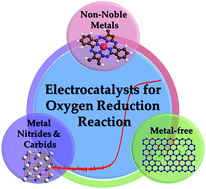Emerging new generation electrocatalysts for the oxygen reduction reaction
Abstract
The design and development of a new economically viable electrocatalyst for the cathodic reduction of oxygen in fuel cells and metal–air batteries is of significant interest. The high cost, scarcity and lack of durability of traditional Pt-based electrocatalysts limit the widespread implementation of fuel cells for practical applications. The emergence of non-Pt and metal-free electrocatalysts for the oxygen reduction reaction (ORR) is promising in the development of energy conversion devices. In this review, we discuss the emerging new electrocatalysts, non-precious transition metals, metal nitrides and carbides and the nanoscale carbon-based metal-free electrocatalysts, for the ORR. Although the actual ORR mechanism and the active site of these catalysts are not well understood, their catalytic activity is undoubtful. The porosity and chemical and electronic environments of the catalysts control their activity. The activity of these catalysts is discussed in terms of onset potential, durability and their tolerance towards anode fuels. The metal-free heteroatom-doped carbon-based electrocatalysts are highly active in alkaline medium, paving the way for the development of alkaline fuel cells, though their long time durability in an actual fuel cell stack is not well explored. The challenges in the use of these catalysts and the lack of fundamental understanding of the catalytic activity are addressed.


 Please wait while we load your content...
Please wait while we load your content...